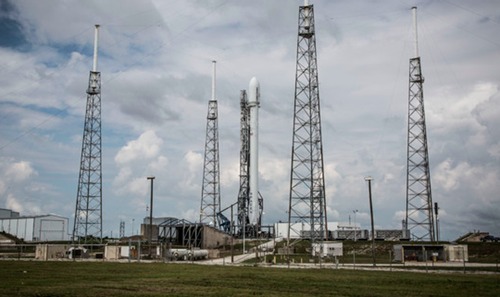
The Falcon 9 v1.1 carrying six ORBCOMM OG2 satellites stands on the launch pad Friday, June 20, prior to the launch scrub that day. SpaceX plans the next launch attempt in mid-July. (credit: SpaceX)
In a short radio interview Wednesday evening, SpaceX president Gwynne Shotwell confirmed that the next Falcon 9 launch attempt would not be until mid-July, and also explained the company’s rationale for not webcasting a launch attempt last weekend.
Appearing on the “Hotel Mars” segment of “The John Batchelor Show” Wednesday night, Shotwell said the last Falcon 9 launch attempt, on June 22, was scrubbed because of an issue with the thrust vector control system on the rocket. ‘We saw, during some pre-flight checkouts on Sunday morning, an issue with a thrust vector control actuator on the first stage,” she said. The problem was something she said likely would not have prevented a launch, but the company wanted to be “super careful” and check all the vehicle’s actuators. “We’re just being ultra-careful here. We don’t want schedule pressures to drive a launch where there can be an issue.”
That launch is now planned for July 14 or 15, a delay due in part to maintenance of the Eastern Range at Cape Canaveral. “The range does want to go on a two-week maintenance shutdown,” she said in explanation for the length of the launch delay. “We couldn’t guarantee that we would be able to fly in the next few days or so” and thus agreed to allow the Air Force to proceed with the shutdown now rather than wait until the rocket was ready to fly.
Shotwell also addressed the public outcry after SpaceX said it would not webcast a Saturday launch attempt, one that was ultimately scrubbed by poor weather. “We were moving away from the webcast format that we had before to get to kind of a ‘higher-tech’ feel,” she said, not going into details about what that transition involved.
Saturday’s weather forecast looked bad enough that it appeared to be a good time to make that transition, she said, given it was unlikely weather would allow a launch. However, SpaceX’s decision created a strong backlash from both the news media and members of the public. “Public opinion was pretty strong on that point,” Shotwell acknowledged. “They like the webcast. They certainly like us to livestream.”
“It’s always easy to jump to some nefarious plot for almost any circumstance that looks odd, but in this case it was simply we were moving away from that specific format anyhow,” she said. “I didn’t think we were going to lift off on Saturday because of the weather.” (A lack of information from SpaceX at the time it announced its decision not to webcast that launch attempt may have contributed to that speculation, though.)
Shotwell responded later in the show to comments made recently by Stéphane Israël, chairman and CEO of European commercial launch provider Arianespace. In those comments, as reported earlier this week by Space News, Israël said they had seen a “strong reaction” from the market after it cut prices in an effort to match those offered by SpaceX for smaller communications satellites. “We’ll be announcing several contracts in the coming weeks,” he said.
“Hopefully they do it in a fair and competitive way,” Shotwell said of Arianespace’s lower prices. “We obviously love competition. It keeps us sharp… On the other hand, it obviously can’t come as a cost to the European taxpayer. It’s got to be a real price.” That’s a reference to “support payments” made by the European Space Agency to Arianespace, currently at €100 million ($US136 million) per year. According to the Space News report, Arianespace is seeking an increase in those annual payments to €116 million (US$158 million) per year starting in 2015.

I believe there are many partues out there … and many nations … which would benefit from very public embarrassment of SpaceX, especially since SpaceX has some impressive goals (reusable rockets) and a track record to match.
I wonder if sabotage is something they guard against. I wonder if / hoe that plays into events like we saw a week ago.
Oops. Shoulda been “parties”. Fat fingers, small phone.
No advanced engineering endeavour should ever be subject to some artificial “deadline”. That way lies disaster….